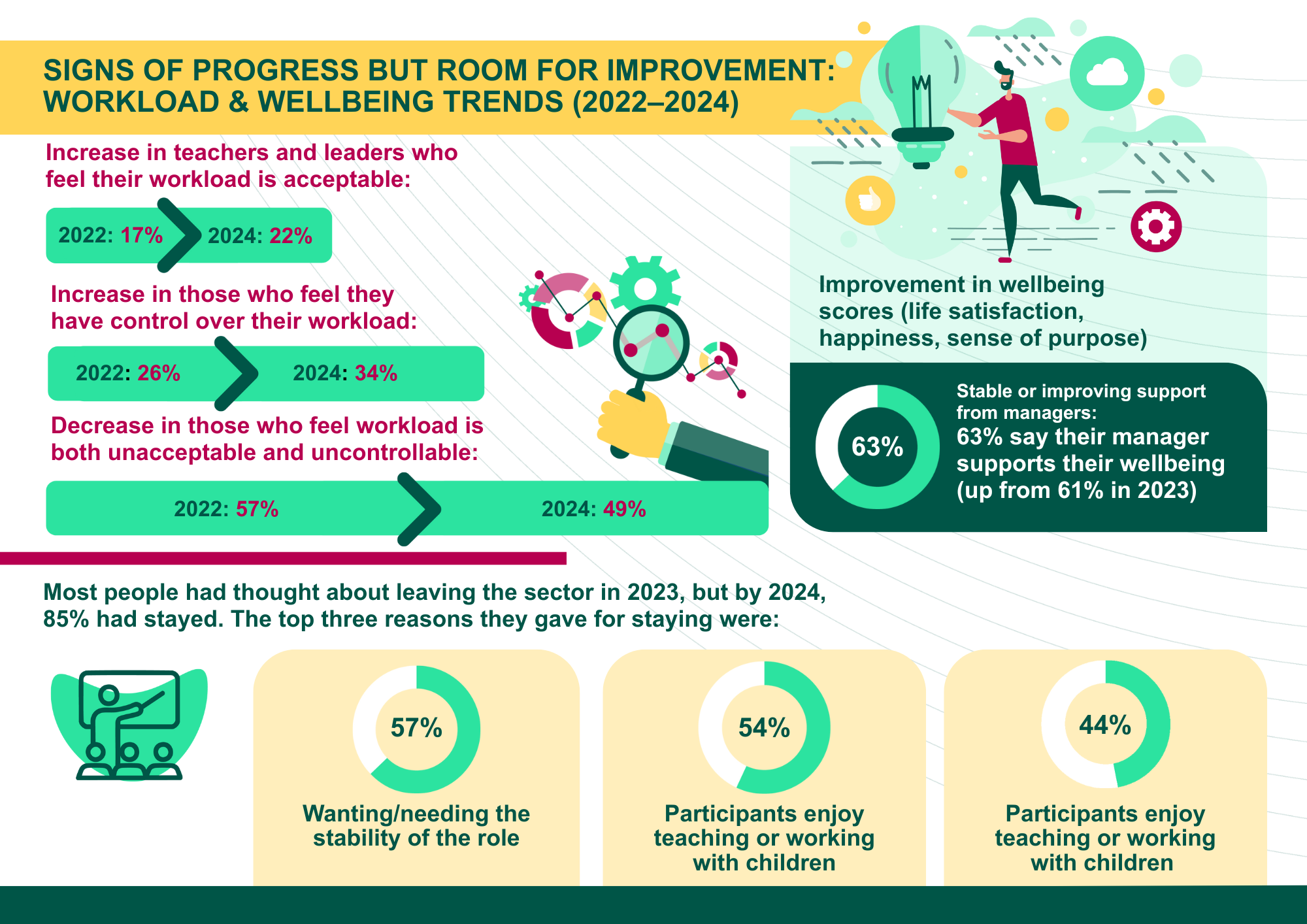
In this fourth project showcase, we spotlight the largest study of the teaching profession in England. Drawing on insights from over 10,000 educators annually, the Working Lives of Teachers and Leaders survey provides a vital evidence base for education policy by capturing the realities of workload, wellbeing, pay, pupil behaviour and more.
Now in its fourth year, the Working Lives of Teachers and Leaders survey is the largest and most comprehensive study of the teaching profession in England. Commissioned by the Department for Education (DfE), our survey captures the lived experiences of over 10,000 teachers and leaders annually––a holistic view covering pupil behaviour, pay, workload, wellbeing, and more. It provides a vital evidence base for education policy and a deeper understanding of the pressures and motivations shaping the profession.
About the client
The Department for Education (DfE) is a government department responsible for children’s services and education in England, including child protection, and all stages of education including higher education.
The challenge
Teachers and leaders continue to face challenges around recruitment and retention. Too few new teachers are entering the workforce, and many that initially start, leave shortly after. More broadly, there is an outflow of experienced teachers and leaders.
To help address this, the Department needed a robust, data-driven understanding of what was happening across the sector and the pressures being faced day-to-day. With the goal of building a comprehensive picture of teachers’ and leaders’ working lives—exploring various areas including workloads, pupil behaviour, pay, wellbeing, and professional development. A holistic approach would help identify the factors influencing recruitment and retention, ultimately informing more effective policy responses.
IFF have run the survey since its inception in 2022, capturing views of over 10,000 teachers and leaders each year.
The approach
We’ve delivered a longitudinal, mixed-mode survey that reaches around 10,000 teachers and leaders each year through a combination of online and Computer Assisted Telephone Interviews. The survey also consolidates elements of previous DfE research—most notably the Teacher Workload Survey—into a single, unified study.
As a longitudinal piece of research, participants are re-invited each year, allowing for the tracking of experiences over time. This enables the DfE to observe trends, monitor changes, and understand the evolving pressures on the profession.
The survey also includes a dedicated strand for those who have left teaching or leading in an English state school. By continuing to engage with leavers, the research captures valuable insights into why people exit the profession and how their new roles compare in terms of stress, wellbeing, and work-life balance.
To complement the quantitative data, we also conduct annual qualitative follow-ups. Across Waves 2 and 3, this involved 100 in-depth interviews focused specifically on workloads. For each subsequent wave, a new theme is selected based on current policy priorities, adding depth and context to the survey findings.

The impact
The Wave 3 findings highlight areas of progress and ongoing challenges, building up a nuanced view of the profession:
- Workload: Average working hours decreased slightly for both teachers and leaders. 22% now say their workload is acceptable—up from 17% in previous years. However, 79% of leavers agreed their workload was acceptable compared with 22% of those still teaching or leading, with average hours at 4 for leavers and 49.3 for those still in an English state school.
- Wellbeing: Life satisfaction, happiness, and sense of purpose all improved slightly in 2024, though they still lag behind national averages.
- Pay: Satisfaction with salary rose to 30% (up from 20% in 2023), though over half still feel underpaid.
- Pupil behaviour: Perceptions of pupil behaviour declined, especially among teachers—only 45% rated it as good or very good.
- Retention: 34% of current teachers and leaders are considering leaving within the next year, with workload and wellbeing cited as top reasons.
Key differences have been highlighted between roles—for example, leaders often work longer hours but tend to report more positively about their schools. Which has revealed how school culture and leadership shape perceptions of workload and wellbeing. The experiences of different groups—such as early-career teachers, SEN specialists, and those working in more challenging school environments—are also brought to light, helping to inform more targeted support.
The results have contributed to a growing policy focus on teacher workload, wellbeing, and flexible working. It remains a trusted and widely used data source across multiple policy teams within the DfE and other government departments.
And beyond the statistics many participants, particularly those taking part in the qualitative interviews, appreciated the opportunity to share their experiences and felt that the survey gave visibility to the issues they face.

The Working Lives of Teachers and Leaders Survey is a vital opportunity to hear directly from those at the heart of our education system. We are delighted to continue working with the Department for Education to deliver this important research each year, providing valuable insights that help shape policy and improve working conditions for teachers and leaders across England.
Alfie Sanders-Earley, IFF Research
Download case study
To find out more about this project, or how we could help you, contact us at hello@iffresearch.com. You can also download the case study here.